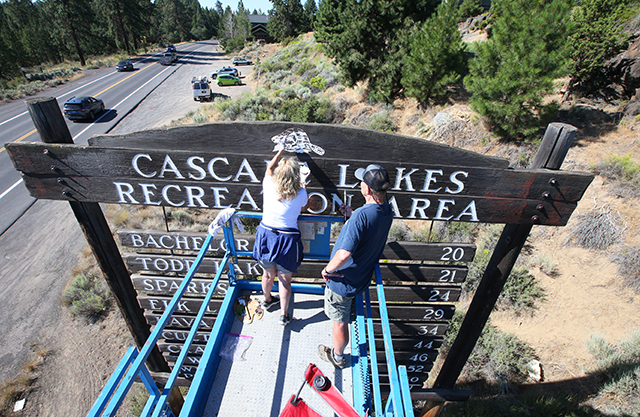Two fake transcripts are caught at COCC
Published 5:00 am Saturday, July 4, 2009
As Central Oregon Community College’s enrollment numbers have shot up, the college’s registrar office has gone through hundreds of transcripts from other schools, giving students credit for classes they’ve taken.
But when office staff recently came across two transcripts from Rochville University, they suspected something was amiss. And they were right.
Trending
In May, Oregon’s Office of Degree Authorization determined the transcripts were issued by a degree mill, and sent cease-and-desist orders to the two Central Oregon women who were trying to pass the bogus degrees they’d purchased from a fake school.
Alan Contreras, the administrator for the Office of Degree Authorization in the Oregon Student Assistance Commission, said COCC was to be commended for discovering the fake transcripts.
“There’s a lot more of this going on than people think,” Contreras said.
The office gets about 50 inquiries each year, he said, and sends out between 12 and 15 cease-and-desist letters to people using fake transcripts in that time. Most of the inquiries come from private businesses and state agencies.
“Oddly enough, we’ve seen three of the Rochville degrees in the last few weeks — two in Central Oregon and one in Salem,” Contreras said. “Having two cases, using the same fake degree in the same part of the state, that’s fairly unusual.”
Aimee Metcalf, COCC’s registrar and director of admissions, said staff members examine every transcript that comes through her office.
Trending
“We try to verify the transcript is coming from an accredited institution,” she said. “There are accrediting agencies that are recognized by the Council for Higher Education Accreditation. And if that’s the case, then we’re really good to go. If not, then we need to dig a little deeper.”
Metcalf stressed that students can still receive credit for classes they’ve taken at unaccredited institutions, or from online universities that are accredited, like the University of Phoenix. Contreras pointed to Gutenberg College in Eugene and Kilns College in Bend as examples of unaccredited schools that are legitimate places of higher education.
After looking to see if the school is accredited, Metcalf said staff in the registrar’s office begin evaluating the transcript. In the two recent cases, she said, “things weren’t adding up with that particular institution. … We had a lot of red flags before we contacted (Contreras’) office.”
Down economy may play a part
The transcripts indicated the students had received degrees from Rochville University, and the students planned to apply those already-earned credits to degree programs they sought to enter at COCC.
“Students with bachelor’s and master’s degrees often come back (to COCC),” Metcalf said. “They’re interested in our career and technical programs.”
By providing their transcripts, they can get credit for classes like math or English composition or other classes required in those programs, thereby shortening the time they spend at COCC. One of the students who were ordered to stop using the fake transcript is currently enrolled at COCC.
Metcalf said the two fake transcripts are the first she’s ever intercepted, and said the previous registrar, Alicia Moore, had also never seen a transcript from a diploma mill.
“I really feel it’s probably driven by the economy,” Metcalf said. “Like everything we’re seeing, these are people in desperate straits, and it’s a tough thing.”
Contreras said that may well be the case.
“I think Aimee’s theory is a good one. It’s certainly true that people are going back to school at this point, particularly to community colleges because they’ve been laid off and the economy is stagnant for now, so they’re trying to find some way to support themselves, and I think there’s certainly been an increase (in the use of fake transcripts).”
Right now, Contreras sees most of the fake transcripts and degrees coming from two providers: Rochville University and Almeda University, both of which have realistic Web sites that say the schools are accredited and offer online degrees.
Almeda, Contreras said, has previously operated out of Idaho and Florida, and is currently causing the most problems with fake degrees and transcripts around the country. Contreras said Rochville University may be operating out of the United States or a Middle Eastern country, though it previously operated from a post office box in Texas.
Often, Contreras said, the fake transcripts appear in clusters, which he said could be a product of people passing word about their fake degrees or just a matter of how the faux universities market themselves.
Contreras recommends that anyone examining the authenticity of a degree should first look for a physical address for the college or university, not a post office box. That indicates the school has permanent roots in a U.S. state or country.
The U.S. Department of Education and the Council on Higher Education Accreditation maintain a list of accredited colleges and universities on their Web sites.
“If you are an employer and you have a transcript that has an address for school but you don’t find the school listed (on those Web sites), then it is probably fake,” Contreras said. “There are a small number of legitimate unaccredited schools.”
Contreras said his office also is willing to help determine the authenticity of a degree or transcript as well.
“What you want is a transcript, not a diploma,” he said. “Anybody can print up a degree from any school.”







